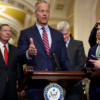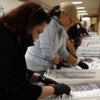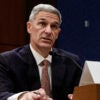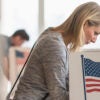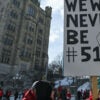Social distancing policies at the state and federal level have forced businesses to close temporarily, which has led millions of Americans to worry about their financial situation. Policymakers must offer focused, temporary solutions that specifically help people who are unable to work or whose businesses have been adversely affected by the closures.
In true Washington fashion, though, Congress is pushing for policies unrelated to the economic and health concerns caused by the epidemic. The latest is that House leaders want to include climate regulations on the airline industry and expand subsidies for the wind and solar industries.
For decades, taxpayers forked over billions of dollars to support wind and solar projects across the country. States contributed with renewable portfolio standards, which mandate that a specific percentage for a state’s electricity mix come from renewable sources, essentially guaranteeing them a market for their product.
This is not only costly to taxpayers, it distorts private-sector investments, prolongs dependency on preferential treatment from Washington, enables cronyism, and contradicts the principle of keeping measures narrow and focused. What’s worse, it comes at a time when both industries have said repeatedly that they are cost-competitive without subsidies.
To be clear, the pandemic is having an immediate adverse effect on energy companies and their employees. Many components for solar projects in the U.S. come from China. Factories closing for social distancing reasons is causing supply chain disruptions.
It has caused upheaval in the oil industry as orders to close businesses depress demand for fuel, and the Russia-Saudi Arabia’s price war further drives down prices. But that does not mean taxpayer-funded bailouts and handouts that could last years beyond the pandemic are needed.
Instead, Congress should offer near-term economic relief to businesses and employees affected by the coronavirus crises. For instance, “delaying tax filing deadlines, delaying estimated tax payments, and expanding access to business net operating losses” would offer welcome tax relief for businesses and individuals.
Assistance for employees of businesses required to shut down or significantly slow down because of government orders would ensure the help gets to those most in need.
For instance, flexible and targeted paid sick and family leave assistance would help families most adversely affected and prevent long-lasting cronyism that entrenches the desires of special interests.
Furthermore, immediate regulatory relief and waivers would lower operating costs and maintain a high level of environmental protection.
Another senseless restriction is the Jones Act, which allows only U.S. vessels to move goods from American port to American port. A waiver from those requirements would lower the costs of transporting fuel and help noncontiguous areas such as Puerto Rico secure more medical supplies, food, and other necessary goods.
Like many other sectors across the country, companies in the energy sector are struggling, and that deserves Congress’ attention. But that’s not an excuse for bailouts and handouts. Enacting policies today that enrich the politically connected for years after the pandemic is over is not what Americans deserve.













